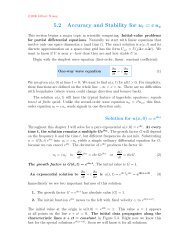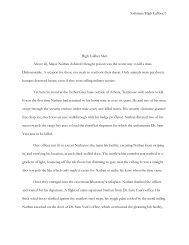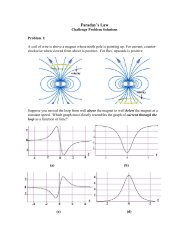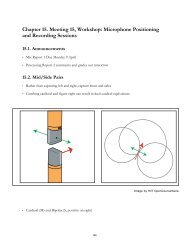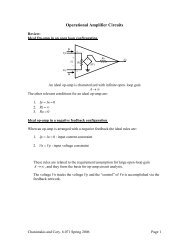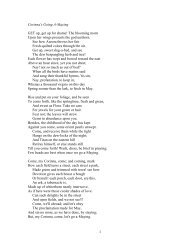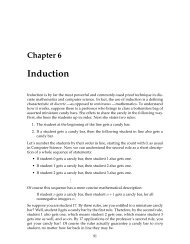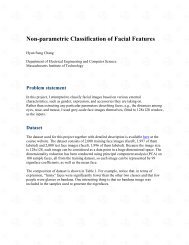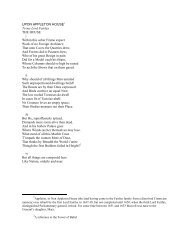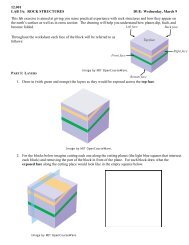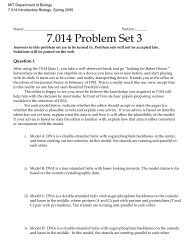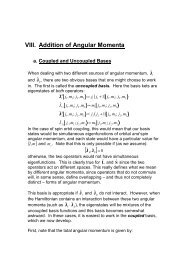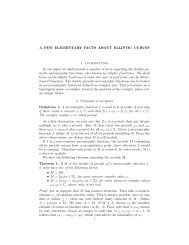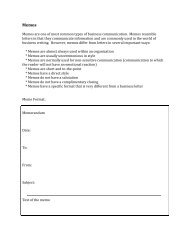MAS.632 Conversational Computer Systems - MIT OpenCourseWare
MAS.632 Conversational Computer Systems - MIT OpenCourseWare
MAS.632 Conversational Computer Systems - MIT OpenCourseWare
You also want an ePaper? Increase the reach of your titles
YUMPU automatically turns print PDFs into web optimized ePapers that Google loves.
6 YVOICE (OMMUNICATION WITH [OMPUTERS<br />
entries, the dictionary must be much larger. Fourth, sometimes correct pronunciation<br />
cannot be gained from looking at a word in isolation, but rather, sentence<br />
context must be employed ("read" has two pronunciations depending on tense;<br />
some other examples are discussed below on the topic oflexical stress). Finally, no<br />
matter how large the dictionary is, there will always be words it does not contain<br />
such as proper nouns, jargon, and new words.<br />
The rule-based approach, in contrast, uses knowledge of spelling rules to derive<br />
pronunciation from the text. There are several advantages to such techniques.<br />
First, the set of rules is much more concise than a lexicon of pronunciations for<br />
each word. Second, it is more flexible; effective rules can generate a plausible pronunciation<br />
for almost any word including names. Third, rules represent succinct<br />
knowledge about a language. Rules may be portable across languages, and the<br />
rules for a language can generate pronunciations for names from that nationality<br />
even while synthesizing a different language.<br />
Although a completely rule-based synthesizer is attractive, this is quite difficult<br />
and not the easiest path to the goal of accurate synthesis of commonly used<br />
words. Since a dictionary may more easily embody correct pronunciation than<br />
some of the more general spelling rules, the usual approach is to store common<br />
words in the lexicon and apply rules to the remaining words. It is best to put in<br />
the lexicon only those common words that are known not to be pronounced well<br />
by the rules. If lookup fails, a rule is invoked which is either correct (or else the<br />
word would be in the lexicon) or at least a reasonable guess for an unlisted and<br />
probably unusual word (which would not be in the lexicon under any circumstances).<br />
Even for a completely rule-based synthesizer, it is quite useful to include a<br />
user-definable phonetic exceptions dictionary to deal with important words that<br />
are not pronounced correctly such as names or acronyms common in a particular<br />
organization. Although these words may be uncommon in the language as a<br />
whole, local use may be frequent; if they are mispronounced, the result will be<br />
greater listener dissatisfaction.<br />
The process of text-to-phoneme translation is performed in several steps. The<br />
first step is text preprocessing or normalization to convert symbols and abbreviations<br />
into their full-text spellings such as converting the symbol I$"to "dollar."<br />
Normalization is not quite as simple as it may first appear; the best full-text<br />
spelling of "$4.35" is "four dollars and thirty-five cents," but "$2.00" is simply "two<br />
dollars." Similarly, some abbreviations, such as "Dr." and "St.," can represent one<br />
of several possible words. "Dr." is usually "doctor" when the word following is a<br />
proper noun ("Dr. Jones"); it is pronounced "drive" when a proper noun precedes<br />
it ("Jones Dr.").<br />
The next step is morphological analysis, which copes with words composed<br />
of several root parts (morphemes) including plurals and compound words such as<br />
"baseball" and "backpack." Many words in English are built by combining root<br />
forms with affixes. An affix may be a prefix such as "un"in "unusual," or a suffix<br />
such as the "ing" in "buying." A word may have multiple affixes at either end,<br />
such as "usability," from "use" + "able" + "y." This last example also shows how<br />
spelling may change as affixes are added; these regular spelling changes must be<br />
included in the morphological decomposition.



